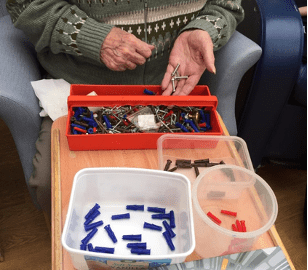My mum says to me that she has two speeds – ‘flat out or flat out’ and I think I may have inherited the same! This is to say that apart from when I am in bed or in the bath, I am always ‘on the go’. For people with this kind of default personality, it is interesting to reflect on how living with dementia might impact on us.
How can we help naturally busy people keep busy by looking at three different areas – a busy mind, a busy heart and busy hands?
For busy minds
For a person living with dementia, this might look and feel a little different as cognitive abilities diminish. But this doesn’t and shouldn’t mean that people don’t still need and want intellectual stimulation.

From my experience, this can sometimes be lacking in care environments and there is a danger of ‘dumbing down’ in the kinds of activities which are on offer. A person who has previously been an English professor or an architect will often still enjoy books and conversations related to these topics.
Volunteers can play a vital role here. In Malton Village in Ontario, Canada, a former police officer benefited from visits from retired officers. One woman I knew delighted in words and language of all sorts. When we went shopping together, she wasn’t at all interested in buying things, but with great gusto, loved reading out loud all the signs in the windows.
It can be helpful to review what is on offer to engage the mind and link these to the interests and life stories of those we are supporting.
For busy hearts
For the person with dementia whose heart is always full of concern for others, a desire to give and receive love will be the core driver in deciding what kinds of things might engage them.
The use of dolls and soft toys in dementia care is an obvious response to this need to continue to nurture others.
Regular contact with children and animals can also meet these needs. In Butterfly homes, we see many creative ideas to help people feel that they are still giving rather just receiving.
For busy hands
I remember observing a pampering and beauty session in one care home in Devon and expecting it to be the older people having their hair and nails done by the care team. However, what I observed was one young team member having her hair washed and combed by a woman living with dementia, and then they both did each other’s nails chatting about colours and a wedding the care worker had recently attended. The friendship and affection between the two women were a joy to witness.

There are many people who always like to be doing practical tasks and this can include cooking, gardening and crafts activities. The skill here is to adapt some of these activities into smaller more achievable steps, for those who are unable to achieve the whole process, for example, stirring a cake mix or watering a plant. Many Butterfly homes create lots of simple invitations for people to do things with their hands, such as leaving towels to fold or a broom to brush the floor.
For a person in the later experiences, this might be something simple to touch and fiddle with on their lap with different shapes and textures. In the very advanced stages of dementia things to chew and suck on with the mouth might be more relevant.
Sorting activities can be a good way of keeping both minds and hands active for those in the more moderate stages of dementia, for example dividing different coloured wall plugs into separate containers.

Consultant and Trainer
MCM

